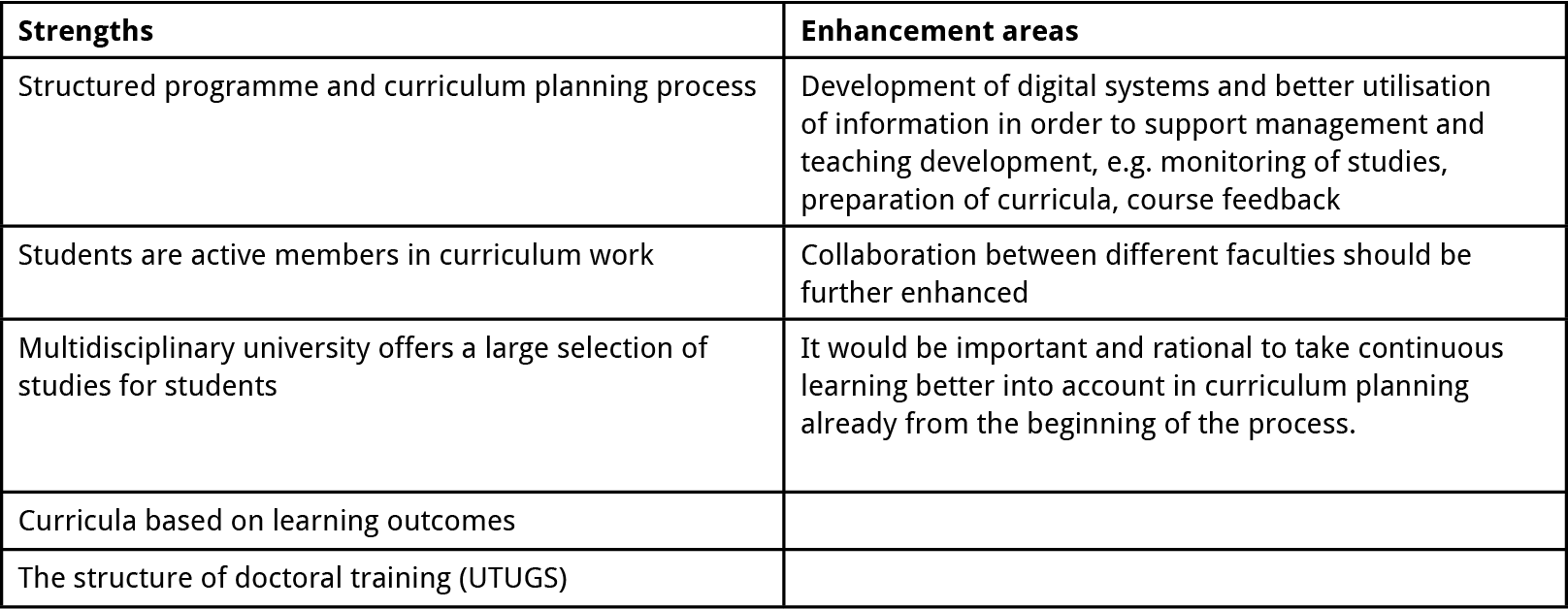National and international framework
Finnish University education is subject to national legislation (e.g. the Universities Act, and the Government Decree on University Degrees and Professional Specialisation Programmes). There is a comprehensive regulation on the degrees which the universities are entitled and obliged to offer, on the structures of the degrees, and on the qualifications of certain professions. UTU provides education on the 1st cycle (bachelor), 2nd cycle (master), and 3rd cycle (doctorate), and the degrees correspond with the Finnish National Framework of Qualifications and Other Competence Modules (FiNQF) levels 6 to 8 accordingly. The scope of the studies adheres to the ECTS credit system.
Strategic approach within the University community
UTU has defined shared guidelines for the systematic planning process of education. The 1st and 2nd cycle degree programmes must relate to the research fields represented at the UTU. The UTU Board decides on new degree programmes (unless stipulated in the legislation, in which case the UTU Board has made the decision to apply for a new field of education) and also on discontinuing degree programmes. Even though the UTU Board holds the strategic mandate, the line of preparation ensures broad participation of the University community, including students.
The criteria and process of starting new degree programmes are described in detail in the decision by the UTU Rector, complemented by the regulations on joint degree programmes. The strategic approach is strongly linked with the decision-making. Doctoral training at UTU occurs in the doctoral programmes, appointed by the Rector.
The proposal for the number of admitted students per 1st and 2nd degree programme in each year is prepared by the faculties and presented to the Teaching and Learning Council that forwards the matter to the UTU Board for decision.
The curriculum planning is based on the general curriculum guidelines by the Vice Rector where, among other things, the main goals of the UTU Strategy are stressed. The faculties offer more detailed instructions for the departments’ curriculum planning. In addition, the systematic self-evaluation process of the degree programmes covers different aspects of the Strategy.
There is a strategic guideline and programme for digitalisation in UTU. This guideline indicates the direction for developing e-teaching and e-learning in the future. UTU is also actively involved in the national digital platform Digivisio.
Future-directed and student-centred teaching and learning
The basic principle of UTU is that teaching is based on the latest research. Teachers are encouraged to publish results on their research and are expected to allocate a part of their annual working hours to research. The career path system was recently renewed (University Board’s decision on 16 Dec 2022). UTU is introducing the senior university lecturer position, which shows high appreciation of teaching merits and development. Doctoral researchers can also participate in teaching.
The current cycle for curricula planning at UTU is two academic years. The curricula in degree programmes (in all three cycles) are based on learning outcomes and they are constructively aligned and student-centred. The faculties give detailed instructions to curriculum planning where teachers and researchers are asked to ensure that every course has clearly described learning outcomes, contents, teaching methods, and assessment and feedback methods that are in line with each other. In the doctoral programmes, UTUGS and the management group of each doctoral programme also have a role in the curricula planning together with the faculties.
The curriculum planning is carried out in close co-operation between the faculty, teaching staff, administrative staff, and students. The PEPPI study system is used as a tool in the curriculum planning. In order to share good practices on curriculum planning, the centralised Educational Support Services offer lectures and workshops to the UTU staff involved in the process. Many units organise additional workshops to support their own curriculum planning. Students take part in preparing the curricula as members of the faculty-level working groups. UTUGS`s working group focusing in training coordinates the general training ensemble available for all doctoral researchers.
Teachers apply the guidelines on study workload when planning and implementing teaching. One ECTS corresponds to 27 hours of student work. Students evaluate their workload per credit along with other feedback. In the curriculum planning guideline, the Vice Rector strongly encourages faculties to use all the available feedback material. The curricula are accepted by the faculty councils.
Strategic aspects in curriculum planning
The needs of working life along with generic skills are closely considered when planning the curricula of the degree programmes. Representatives of stakeholders are either included in the working groups preparing curricula or their views are otherwise considered in the planning process. Most faculties have advisory boards with stakeholders as members.
Internationalisation is recognised as an integral part of UTU education in order to guarantee that students acquire the skills that are needed in order to operate in an international environment (see more in the UTU international programme). All students have the possibility and are encouraged to take part in international student exchange and all courses completed during the exchange can be included in the UTU degree. The UNICOM project promotes the placement of international talents in the Finnish labour market.
Sustainable development is one of UTU’s strategic underlying themes. There is an ongoing work at UTU on sustainable development and including sustainable education in curriculum planning and in teaching and learning practices. As first steps in the process, the SDGs have now been highlighted in course definitions in the PEPPI study system.
Continuous learning is emphasised throughout the UTU Strategy. Continuous learning opportunities are offered via open university studies, specialisation studies, non-degree studies, executive education and customised training, open study materials, and online courses (MOOCs). In the planning of curricula, the aim is to ensure that UTU graduates acquire the skills and motivation to maintain and enhance their expertise throughout their career.
